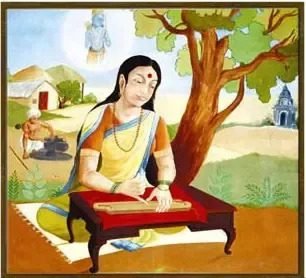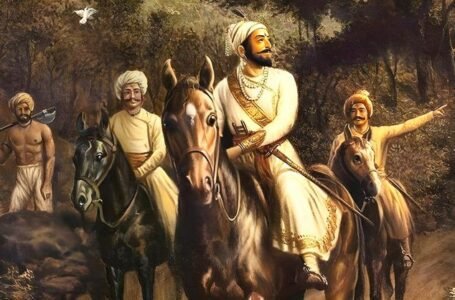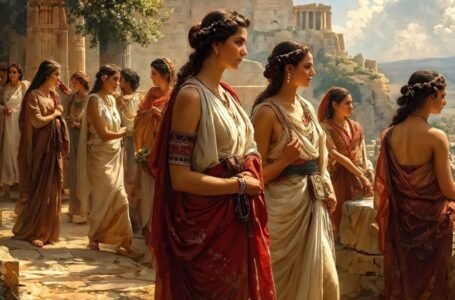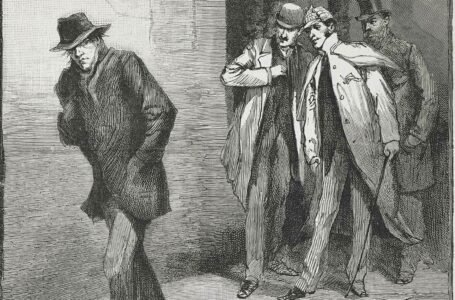Ghosha: The Mantradrika and The Brahmavadini

We study a lot about male seers or rishis. We have in fact, heard about scores of potent and knowledgeable rishis and their marvellous achievements but did you know that a woman seer or rishika has also contributed to the hymns of the oldest Rig Veda? No? Then stay tuned because in this blog we are going to talk about Ghosha.

Ghosha, also known as ‘Mantradrika’- well versed in mantras and ‘Brahmavadini’ – speaker of Brahmana was an ancient seer who wrote two hymns for the Rig Veda. Ghosha’s story is really important for us to know since it is a beacon of hope, devotion, and God’s divine presence. It teaches us how hope and faith in God can change our life. No matter how tough the circumstances get, the omnipotent God is always there watching us and trying to help us out.
Ghosha was born in the vedic period to Kakshivat. Her grandfather was Dirghatamas. Both her father and grandfather possessed deep and profound knowledge of vedas due to which Ghosha also learned a lot about vedas since her early childhood. Her father and grandfather have also contributed hymns to the Rig Veda. Ghosha was born with a skin malady, probably leprosy, that disfigured her face. Due to this she was kept inside the house and couldn’t go out to play with her friends like other children. Her skin condition distraught and stressed her as she grew up.

Nobody was ready to tie the knot with her, when she reached the marriageable age, due to her disfigured face. This really disheartened her. Seeing her grief her father, who had a deep knowledge of vedas, advised her to pray to Ashvini Kumaras. According to Hinduism, Ashvini Kumaras or simply Ashvins are two twin brothers and doctors of the deities. In Rig Veda, Ashvins are mentioned to be vivacious and indefatigable twin horsemen riding in horse chariots and curing Gods and people.
Ghosha started praying ardently to the Ashvins. She supplicated them to cure her disease. Pleased by her prayers the Ashvins taught her Madhu Vidya – a vedic science teaching to rejuvenate youth, beauty, and cure her disease. Shortly, Ghosha got cured of her skin malady and regained her beauty. She got married and had a son named Suhastya, who also composed hymns in the Rig Veda.

This incident marked a pivotal teaching in her life. She realised that God is always there for you. Her devotion towards God amplified and she would spend most of her time preaching spirituality. As a gratitude to the twin Ashvins she composed two hymns of fourteen verses each in the praise of the Ashvins. These hymns are 39 and 40 in the tenth chapter of the Rig Veda.
“Ashvins Your radiant Chariot -whither goes it on its way? Who decks it for you, Heroes, for its happy course starting at daybreak visiting each morning every house, borne hitherward through prayer unto the sacrifice?”
“Where are you, Asvins, in the evening, where at morn? Where is your halting place, where rest ye for the night? O Heroes, this I beg of you. ‘Be near me in the day, be near me in the night’.”
Ghosha went on to pass her spiritual and devotional learnings to other people throughout her life.

The notable achievements of Ghosha are:
- She is one of the few women whose hymns have been published in the Rig Veda. Ghosha is a pioneer of female devotion and female knowledge. She proved with this achievement that women can also have deep and profound knowledge of the vedas just like their male counterparts. Ghosha will keep inspiring millions of women to come.
- Ghosha wrote two hymns that are now a part of the oldest veda i.e. the Rig Veda. Both her hymns contain fourteen verses each and are published in the tenth chapter of the Rig Veda. One of her hymns sings hosannas of praises for the twin Ashvins for curing her skin malady and rejuvenating her beauty. The other hymn talks about her intimate desires she seeks from her marriage.
- Due to her great contribution and resounding knowledge and devotion, Ghosha has earned the title of ‘Mantradrika’ meaning well versed in mantras and ‘Brahmavadini’ meaning speaker of Brahmana.
- Like many early Vedic philosophers, Ghoshi’s work played a role in preserving and transmitting ancient Indian knowledge, contributing to the continuity of philosophical and ritualistic practices.
- Ghoshi’s works are studied by many modern-day thinkers, philosophers, and writers.

Not much is known about the cause of Ghosh’s death. It might have been due to the natural cause. Ghosh is no longer with us in this materialistic and mortal world but her hymns, her devotion, her spirituality, and her life story keeps motivating millions of us. She is a beacon of hope. She teaches us how if she can battle her ailment then we, by believing in God, can also face any peril of life. Ghosh is also a pioneer of female knowledge. Every woman should read about her and be proud of her for her knowledge. Ghosh challenged her male counterparts with her exceptional knowledge about vedas. She truly is ‘Mantradrika’ and ‘Brahmavadini’.


